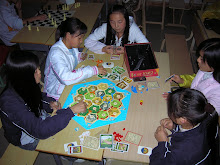Last Friday I found myself, once again, packing my backpack for a trip to Chengdu. This would be my fourth trip back to my training site in the last 11 months: no small number considering the train ride is an overnight, 18 hour ride through the countryside. The journey itself can't be viewed in that context, however, because the scenery is an entire window away. Most of the trip is sitting through a smoke-filled train as people ignore the no smoking signs and light cigarettes. It is a hot, stuffy, torpid slog beset with gawking Chinese people muttering "Foreigner," to one another and smiling as if there was some big joke about the fact that my skin is a different color. Honestly, riding the train is all of these things. That is, unless there are other Peace Corps Volunteers riding with you (there were 3).
Our trip was a little more "What's new with you?" listening to long stories of adaptation and, eventually, what amounted to our acceptance that we had settled in - we were here at last. These trips are smoothed by the fact that we are together in this smoky cage; we are looking out for one another. This is the comfort that leads people in larger cities to become a part of the expatriate crowd, drawn to the easy expatriate lifestyle.
The training itself was to prepare several of the volunteers to help the new Peace Corps China volunteers who will arrive in early July. Each volunteer had selected a subject for the Peace Corps list for presentation. Todd and I will teach "Scarcity and Abundance - How to make the most with no resources or abundant resources." The range of resource availability probably matches that of future volunteers (from chalkboard and chalk to projector and computer).
The training was taxing, and on more than one occasion I found myself wondering when we would actually talk about our sessions with one another. While passing a rubber band with a straw in my mouth I thought, "This is a metaphor for working together, how interesting," before I began to analyze how the metaphor actually breaks down because it was obviously a strait-line activity which resembled top down command and delegation rather than teamwork. But my pessimism waned when the afternoon was dedicated to talking about our future sessions (how would we unify without repeating information, what were we going to teach, were there any suggestions?).
There were occasions when I argued with other volunteers. "Perhaps you should mention something about the different values related to materialism," I suggested.
"You mean how our students are so materialistic?" she asked.
"What?! No! How we are materialistic as Americans," I responded.
"Oh, I don't know about your students, but mine are very materialistic." she said.
And though I doubt that she has a true understanding of her own students when it comes to true materialism (especially when compared to any American), I do not doubt that there are differences between our colleges.
"Maybe you should consider talking to my site-mate, whose literature students don't speak English," I said to another volunteer presenting 'How to Teach Shakespeare in China.' Everyone laughed because they thought I was being funny.
"I'm not joking," I said. The room was quiet. They were embarrassed for me. Surely the students spoke English: how else would my site-mate teach them literature?
"I'd like to see that - I'm really interested in how she does that," he said.
I really do wonder if he cares, however. It seems that the people in larger cities have students who are able to do so much more. The attitudes are different. The levels of English are different. I found myself actually feeling jealous of their situations. I want to talk about the big questions. I'm tired of mundane conversations for practicing sentence structures. I felt left behind in my little corner of the world.
On the way home I pondered. I thought of all the time I've spent here. I thought of the frustrations and the successes. Wondering if I have been worthwhile to the students, the idea that my role is different that I originally thought is a recurring theme.
I haven't enjoyed teaching here like I did in America. Let me say this carefully: I have enjoyed it, but the rewards are so different. Often I have felt that the students look upon me as a teacher with a lack of experience (a death sentence in the Chinese classroom). My elementary experience is seen as not the same and there is a contingent of students who think the classes are boring (lately I have joined them - it's hard to get them motivated with a dated article from their textbooks about recycling).
My role has constantly changed, without changing at all. I have always been an English teacher, and things will remain this way until I return to America. My attempts to help people in Wenchuan, the area hit hardest by the May 12th earthquake, were met with a redirection by staffers in the Peace Corps office ("perhaps there is something a little closer to your site that you can help with"). And there was something - a flood just outside our city. I spoke with the foreign affairs official at my school and he said he would talk with someone higher-up. I have yet to hear back, despite repeated visits to his office to broach the subject. I am available to raise money and help the community, but there is not even a phone call after weeks of waiting. It goes back to the reason we are here, the reason that is cited again and again by Chinese officials: Just do your best to teach English. A message is being sent to me: stop bothering everyone with my desire to find another Chinese tutor (a request made more than 10 times since I began asking 7 months ago). Stop wanting to do anything else and just teach English.
But what if that's not going so well? I wonder to myself. I need something else because languishing in a sea of uninterested students and uninspired teaching is making me weary. The Peace Corps has 3 goals when they enter any country, and goals 2 and 3 have become my new favorite things. I cling to them relentlessly as I watch the school-year draw to a close.
I'm looking ahead to the fall: a new year with new students, new classes and new hopes. A fresh start.
6.18.2008
Subscribe to:
Post Comments (Atom)








No comments:
Post a Comment